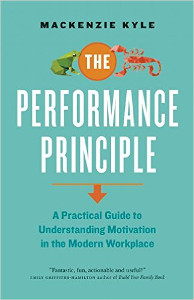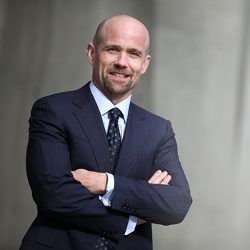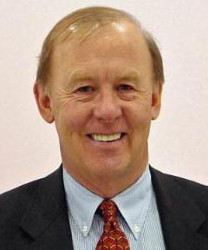Posted by Elena del Valle on January 23, 2017

Adrian LaTrace, CEO, Boyd Industries
Photo: Boyd Industries
A podcast interview with Adrian LaTrace, CEO, Boyd Industries, is available in the Podcast Section of Hispanic Marketing & Public Relations, HispanicMPR.com. During the podcast, he discusses transforming a small business to meet evolving market demands with Elena del Valle, host of the HispanicMPR.com podcast.
Adrian arrived at Boyd Industries with more than 25 years of leadership in companies ranging from start-ups to large public corporations in the healthcare, renewable energy, and aerospace industries. He relies on his experience in developing high-performance organizations to support Boyd’s goals and provide leadership for the dental equipment needs of the future.
To listen to the interview, scroll down until you see “Podcast” on the right hand side, then select “HMPR Adrian LaTrace” and click on the play button below or download the MP3 file to your iPod or MP3 player to listen on the go, in your car or at home from the RSS feed. Some software will not allow flash, which may be necessary for the play button and podcast player. If that is your case, you will need to download the file to play it. To download it, click on the arrow of the recording you wish to copy and save it to disk. The podcast will remain listed in the January 2017 section of the podcast archive.
Audio
Posted by Elena del Valle on January 19, 2017

The Performance Principle
Photos: MNP
After Making It Happen, his first non fiction title, was published, Mackenzie Kyle, managing partner for Advisory Services in British Columbia, Canada for MNP, a consulting and accounting firm, he discovered he liked to write and wanted to work on another one. As a result The Performance Principle A Practical Guide to Understanding Motivation in the Modern Workplace (Figure 1 Publishing, $21), was published in 2016. It took four years from his first typed page until it appeared in print.
Written in the form of a novel The Performance Principle features the story of Will Campbell, a newly promoted executive of a firm which has fallen on hard times. Over the course of several tumultuous months, Campbell and his team learn the principles of performance management and the powerful results it can deliver. Kyle’s target audience? Anyone tasked with managing people, from people supervising one other person, to senior managers responsible for large teams. He believes that the ideas in the book are helpful for individuals interested in working more effectively as part of a team; that it can help them to better understand their own motivations, and work more effectively with other teams members.
“My motivation was really two-fold,” Kyle said by email when asked what prompted him to write the second title. “I was looking for an alternative way to communicate a number of ideas around performance management, and I’d had good success with this approach with my previous book (which dealt with project management.). The second reason was fairly personal – I like the writing process, and tackling The Performance Principle was an excuse to do something work-related, that also allowed me to do some creative writing.”
The new book is a sequel to the first book, sharing most of the same characters, who a number of years later are facing some new challenges. The author explained that there is sufficient information about the back story in the new book so it is not necessary to read the first book. At the same time, his approach was similar in both books. The protagonist (Campbell) is the focal point for uncovering the underlying issues, and his sage (his mother-in-law) is the character that brings the ideas about performance management to the team. Kyle wrote the story to help the reader walk through the implementation of the ideas in a (relatively) realistic situation.
When asked why he wrote it in the form of a novel he replied, “I’ve found that wrapping a story around a set of ideas can be a more interesting (some would only go as far as ‘less painful’) way of getting those ideas across. It also provides some context in which people can ‘see’ the ideas in action. I really enjoy the creative writing process, and the challenge of putting the ideas into a story or case study was something I found to be personally interesting (and enjoyable). I keep looking for that job ad for a ‘full time novelist’ but so far haven’t seen it.”

Mackenzie Kyle, author, The Performance Principle
“While I don’t address introverts and extroverts specifically as personality types in the book, I do talk about the reality that different people find different things motivating (or punishing), and how work with that,” the author said when in response to a question about the relevance introvert and extrovert personalities have on the topic. “Recognizing these differences is key to working effectively with a team, and essential for a manager. For example, someone we characterize as an extrovert might find public recognition very rewarding for doing a good job on a particular task; someone we might call an introvert would actually find being singled out in front of the group to be punishing. As a result, they might avoid doing whatever it is that gets them that recognition, even if it’s not the performance we’re looking for.
One caveat though, and that is to avoid pigeonholing people into one category or another. For example, very few are pure extroverts or pure introverts. Instead, they will usually lean toward one side, but have characteristics of the other. This means everyone needs to be treated as an individual when determining what he or she find motivating. Broad generalizations can result in missing the mark, and ultimately less effective performance.”
Kyle has more than 25 years of experience in operations improvement and restructuring, and has provided specific assistance in everything from strategic planning to performance management to managing projects. He has worked in manufacturing, transportation, telecommunications, and the public sector, and internationally in the United States, Australia, New Zealand and Asia.

Click to buy The Performance Principle
Comments:
Filed Under: Books
Posted by Elena del Valle on January 9, 2017

Eliza Kubarska, filmmaker, Walking Under Water
Photo: David Kaszlikowski/Vertical Vision Film Studio
A podcast interview with filmmaker Eliza Kubarska is available in the Podcast Section of Hispanic Marketing & Public Relations, HispanicMPR.com. During the podcast, she discusses her film Walking on Water about the Badjao people in Borneo (available on the World Channel website:http://worldchannel.org/programs/episode/dw-s1-111-walking-under-water/) with Elena del Valle, host of the HispanicMPR.com podcast.
Eliza, a Polish alpinist and traveler, specializes in adventure film making and extreme location work. In 2007, she set up her own film company Vertical Vision Film Studio, where she produced her first multi-awarded feature documentary, What Happened on Pam Island, also known as Mountain Love Story. In 2014, Walking Under Water, her next documentary was awarded Hot Docs Jury Prize and John Schlesinger Award at Palm Springs Film Festival.
In her newest film K2 – Touching the Sky, Eliza, together with an international group of grown-up children of acclaimed mountain climbers, sets out on an expedition to reach K2 base camp, the burial place for those who lost their lives on K2 in the summer of 1986.
To listen to the interview, scroll down until you see “Podcast” on the right hand side, then select “HMPR Eliza Kubarska” and click on the play button below or download the MP3 file to your iPod or MP3 player to listen on the go, in your car or at home from the RSS feed. Some software will not allow flash, which may be necessary for the play button and podcast player. If that is your case, you will need to download the file to play it. To download it, click on the arrow of the recording you wish to copy and save it to disk. The podcast will remain listed in the January 2017 section of the podcast archive.
Posted by Elena del Valle on January 3, 2017
What We Can Learn
By Jay Gronlund,
President, The Pathfinder Group

Jay Gronlund, president, The Pathfinder Group
Photo: The Pathfinder Group
Without doubt, Donald Trump’s election victory was a shock to most people, especially pollsters, the news media and those living in urban centers across the country. In some ways, it was a contest of character between the two most unfavorably perceived presidential candidates in history. However, from a branding perspective, the compelling reasons behind each vote was more about what each candidate stood for. And this is what branding is all about – making promises that resonate with people’s intense emotional desires, to connect with them.
Click to read the entire article Positioning the Trump Brand for Victory – What We Can Learn















